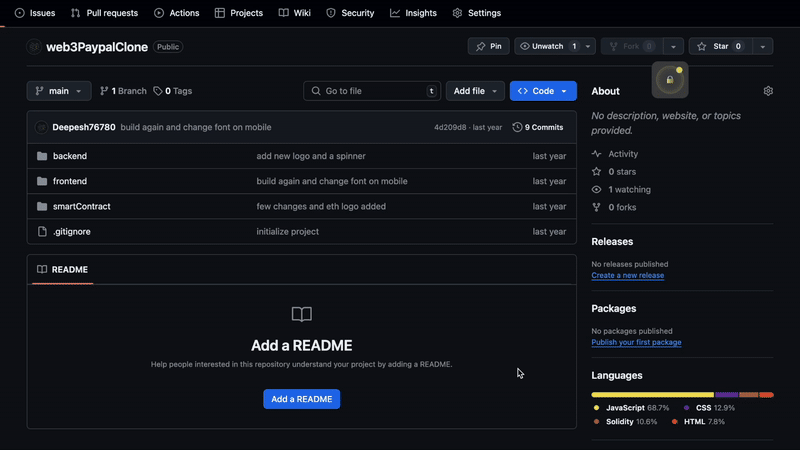GitDox
Focus on Building.We'll Handle the Docs.
Stop wasting time writing documentation. GitDox automatically generates comprehensive docs by analyzing your code, PRs, and issues while you focus on what matters - building great software.
Why READMEs Are Hard to Write
Time-Consuming
Writing good documentation takes precious development time away from building features and fixing bugs. It's often the first thing to be deprioritized when deadlines loom.
Quickly Outdated
As code changes, documentation drifts. Manually keeping docs in sync with rapidly evolving codebases is nearly impossible, leaving teams with misleading or obsolete information.
Context Gets Lost
The valuable context from PR discussions and issue threads - why decisions were made, what alternatives were considered - rarely makes it into documentation.
Inconsistent Quality
Documentation quality varies widely across teams and projects. Without standardization, new team members struggle to understand code and senior developers waste time answering the same questions.
GitDox Solves These Problems
By automatically generating and maintaining documentation while you code
Code Analysis
Automatically analyzes your codebase to extract structure, functions, and relationships without you writing a single line of documentation.
PR Context
Preserves the "why" behind code decisions by analyzing pull request discussions and incorporating them into your docs.
Issue Integration
Incorporates context from issues to provide comprehensive understanding of implementation details and reasoning.
How GitDox README Generation Works
Intelligent Documentation
GitDox doesn't just generate static documentation. It continuously learns from your codebase, pull requests, and issues to create living documentation that stays in sync with your project.
When code changes, documentation updates automatically. When developers discuss implementation details in PRs, that context is preserved in the docs.
Installation & Setup
Add GitDox as a collaborator to your GitHub repository. It works silently in the background, requiring zero configuration to get started.
⚠️ Important Note:
Please use public repositories for now. Adding GitDox to private repositories grants us access to that repo. We're strengthening our pipeline for private repos, but currently recommend using GitDox with public repositories only.
Initial Scan
GitDox performs a comprehensive analysis of your codebase, analyzing structure, functions, dependencies, and historical context from PRs and issues.
Documentation Generation
Based on the analysis, GitDox automatically creates comprehensive markdown documentation, including API references, architecture diagrams, and implementation details.
Continuous Updates
As your codebase evolves, GitDox automatically updates documentation through pull requests that you can review and merge.
Getting a Perfect README with GitDox
1. Add GitDox as a collaborator
Go to your GitHub repository, navigate to Settings > Collaborators, and add@gitdox-ai as a collaborator.
https://github.com/username/your-repo/settings/access
⚠️ Important Note:
Please use public repositories for now. Adding GitDox to private repositories grants us access to that repo. We're strengthening our pipeline for private repos, but currently recommend using GitDox with public repositories only.

2. Initial README Generation
After adding GitDox as a collaborator, it will automatically create a PR with your initial README file. Review and merge this PR to add the README to your repository.
The comprehensive README will be added directly to your repository root, making it immediately visible to anyone who visits your GitHub project.
That's it! GitDox handles the rest automatically.
Stop Writing READMEs
The average developer spends 20% of their time creating and maintaining READMEs and documentation. What could your team build with that time back?
Configuration Options
README Format
Configure GitDox to generate your README in different styles with customizable sections based on your project's needs.
Custom Templates
Create custom documentation templates that match your organization's branding and documentation standards.
PR Behavior
Control how and when GitDox creates documentation PRs with options for automatic or manual triggers.
Custom Integrations
Connect GitDox with other documentation tools like Confluence, Notion, or custom wikis for seamless syncing.
Frequently Asked Questions
Is GitDox free to use?
GitDox offers both free and premium tiers. The free tier allows for basic documentation generation for public repositories, while premium plans offer advanced features and support for private repos.
How does GitDox handle sensitive code?
GitDox processes all code locally within your repository context and never stores your source code on our servers. Documentation generation happens through secure GitHub Actions that respect your repo's privacy settings.
What programming languages does GitDox support?
GitDox currently supports JavaScript, TypeScript, Python, Java, Go, Ruby, and C#. We're constantly adding support for more languages based on community feedback.
Can I customize the documentation style?
Yes! GitDox allows complete customization of documentation templates, styles, and formats through the configuration file. You can also provide your own templates for GitDox to use.